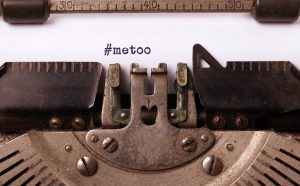It’s Time For A #MeToo Movement In The Judiciary
It’s on all of us in the legal profession to be part of the solution.

(Photo via Getty)
So much about the #MeToo legal academia situation involving former George Mason Law professor Joshua Wright, who was accused of sexual harassment and misconduct involving students, deeply resonates with what I encounter in the judiciary as I work to improve the clerkship system: the culture of silence and fear surrounding powerful people, misconduct as an “open secret,” individuals staying silent about mistreatment due to fears of reputational harm or retaliation (or self-interest), power imbalances that enable misconduct, and why not speaking up perpetuates problematic behaviors.
This summer, Wright announced that he was leaving his tenured position at George Mason Law. Then, in mid-August, several former GMU Law students, as well as a former job applicant, came forward, alleging sexual misconduct, including sexual relationships with students and leveraging a nonexistent job opportunity to get a date. So far, at least eight accusers have come forward.

How to Achieve Quicker, More Valuable Case Settlements with Minimal Effort: A Guide for Personal Injury Lawyers
Unlike other industries, the federal judiciary has mostly resisted the #MeToo movement. There were of course the former clerks and others who accused former Ninth Circuit judge — and notorious harasser — Alex Kozinski of misconduct in 2017, which ultimately led to his resignation. Following this, the federal judiciary created a Workplace Conduct Working Group to “study” the issue and make some modest recommendations. Then a former Ninth Circuit law clerk testified before the House Judiciary Committee in 2020 about another judge whose mistreatment of clerks was an “open secret” for decades — the late Stephen Reinhardt.
In July 2021, recognizing the dearth of judiciary workplace protections and confidential reporting mechanisms, members of the House and Senate Judiciary Committees introduced the Judiciary Accountability Act (JAA), legislation that would extend Title VII protections to judiciary employees, including law clerks and public defenders, finally enabling them to sue and seek damages for harms done to their careers, reputations, and earning potential. The House Judiciary Subcommittee on Courts, Intellectual Property, and the Internet held a hearing on the JAA last March, for which I submitted written testimony; former Middle District of Georgia law clerk Caitlin Clark testified about being fired after disclosing her pregnancy; and former North Carolina federal public defender Caryn Devins Strickland testified that several members of federal defender leadership harassed and ultimately retaliated against her. Strickland’s lawsuit, alleging constitutional violations because she is not protected under Title VII, is ongoing.
The Wright situation echoes my experience engaging with law clerks and the judiciary. Wright’s accusers encountered a culture of silence and fear not unlike the judiciary’s — one that historically protects the powerful. While the judiciary may be even more difficult to penetrate than legal academia, the parallels highlight the necessity of fostering a culture of reporting within and candid dialogue about workplace conduct in the federal judiciary — and throughout the legal profession.
Several accusers alleged that Wright’s sexual misconduct was an “open secret,” including at the law school where he worked. Yet it was not until a former student filed a Title IX complaint against Wright years later, in 2021, that the allegations were thoroughly investigated. (It has since been reported that Wright resigned rather than face termination.)
Sponsored

The Smartfirm Playbook - Thriving In Today’s Legal Landscape

How Generative AI Is Disrupting Law Firm Billing Practices

InterAction+ Brings Power Of CRM Software To Law Firms Of All Sizes

How Generative AI Is Disrupting Law Firm Billing Practices
In the world of judicial clerkships, the judiciary, and the law schools that help facilitate these positions, it is often an “open secret” that certain judges mistreat their clerks. Yet in too many instances, judges continue to get away with outrageous misconduct. Why? Those with information about misbehaving judges (particularly law school clerkship directors, deans, and faculty members) either selectively share this information with students or encourage them to clerk for “challenging” judges (a euphemism for mistreatment) anyway because the clerkships are so prestigious. They certainly do not share this information with those in judiciary leadership who could investigate and potentially discipline judges.
Troublingly, too many law schools fear angering any judges, even those known to mistreat clerks. But those with information should not protect these judges, nor should they encourage students to clerk for them. As long as students opt to — or are sent to — clerk for known (or suspected) harassers, we will never stop the cycle of mistreatment. Sadly, the only people who do not know the severity of these “open secrets” are the law students who depend on their schools for clerkship information.
There is a related and troubling culture of silence and fear in the legal community — one of deifying powerful people (particularly judges, but to a certain extent also tenured law professors) and disbelieving subordinates (law clerks and students). I hear often from clerks who experience mistreatment that they were told — including by law schools, legal employers, and mentors — that the right professional decision is to stay silent. I was. Career services professionals tell me that most clerks who are mistreated just want to keep their heads down and move on. Yet silence perpetuates problematic behaviors, because judges will not be disciplined if clerks do not report. Judiciary leadership cannot act on what it does not know about.
There is an enormous power disparity between fresh-out-of-law-school clerks and judges — the most powerful members of the profession — that makes it incredibly difficult to speak up about mistreatment. This was certainly the case with Wright. The students (and employees) over whom he wielded power did not feel they were in a position to say “no.” In hierarchical workplaces like the judiciary and legal academia, it is particularly important that robust workplace policies be implemented and rigorously enforced, that multiple confidential reporting channels exist, and that survivors are not only “believed” but supported and protected.
I imagine part of the calculus for the Wright accusers was the backlash they might face. Law clerks considering speaking out are taught to fear reputational harm in the job market and retaliation by judges. As I advocate for a culture of reporting and honest dialogue around the full range of clerkship experiences, I think often about how to prevent this. We must extend legal guardrails like Title VII of the Civil Rights Act to the judiciary — including protection against retaliation for law clerks who report. We should empower clerks to share information anonymously with a third-party resource and with clerkship applicants, one that judges will not have access to. And legal employers should stop treating a judge’s reference as the end all, be all — especially when the judge is known to mistreat clerks or when the former clerk confides in a prospective employer about mistreatment.
Sponsored

LawPay Pro Offers Upgraded Time And Billing Essentials

How to Achieve Quicker, More Valuable Case Settlements with Minimal Effort: A Guide for Personal Injury Lawyers
It’s on all of us in the legal profession to be part of the solution. It is considered a black mark on someone’s reputation if they speak out against workplace mistreatment. It shouldn’t be. Some judges I’ve spoken with characterized speaking out as “a badge of honor.” This is how we should reframe whistleblowing. It is brave, impactful, and empowering. If law schools and legal employers empowered attorneys to speak out, rather than encouraged them to stay silent, we could reduce workplace mistreatment, hold bad actors accountable, and make the profession safer for everyone. While there aren’t yet legal protections against retaliation, we can create cultural protections by supporting whistleblowers.
By not speaking up, those with information about misconduct protect abusers and perpetuate problematic behaviors. It is incumbent upon everyone with information to report. If you do not report, powerful people will continue to abuse their power. Reporting misconduct and initiating investigations is how we stop the cycle of mistreatment, create real judicial accountability, and protect future clerks against mistreatment.
It is not enough to whisper about mistreatment. It is not enough to quietly steer some students away from problematic judges. Silence perpetuates misconduct and protects abusers.
The decision to report or speak publicly is deeply personal. Yet the public messaging around whistleblowing focuses on the professional, social, and cultural repercussions of the #MeToo movement, rather than highlighting the benefits to survivors of speaking out.
Workplace mistreatment creates psychological consequences. Law clerks, like the law students who encountered Wright, suffer in silence. But speaking out is empowering and liberating. It is a mode of accountability to share your experience. The powerful have historically benefited from survivors’ silence. You’ll help countless others to know they are not alone.
Some in judiciary leadership have taken the position that they solved these problems because we haven’t had another public Kozinski-type incident. That is incorrect. Yet the dearth of law clerks speaking out enables judiciary leadership to discount the scope of these problems and disclaim responsibility for correcting them.
As we approach the sixth anniversary of the #MeToo movement, a groundswell of law clerks should speak up to change the culture in the legal community. As more law clerks are finally empowered to share their experiences, we’ll force desperately needed change in the courts. It’s beyond time for a #MeToo movement in the judiciary.
Aliza Shatzman is the President and Founder of The Legal Accountability Project, a nonprofit aimed at ensuring that law clerks have positive clerkship experiences, while extending support and resources to those who do not. She regularly writes and speaks about judicial accountability and clerkships. Reach out to her via email at Aliza.Shatzman@legalaccountabilityproject.org and follow her on Twitter @AlizaShatzman.







